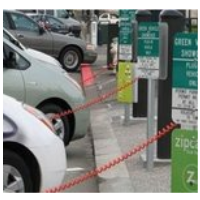Company Awarded EV Charging Station Monopoly as Penalty Is Way Behind on Delivery

When the California Public Utility Commission (PUC) agreed to let NRG Energy build a network of electric car charging stations at a cost of $100 million to repay the state for ripping it off on electricity during the energy crisis a decade ago, critics said the company’s “punishment” was too small and amounted to winning a $100 million no-bid development contract.
The critics wanted the money, and they still might prevail.
The Associated Press reported last week that NRG subsidiary NRG eVgo has built just 10% of the stations it promised for 2013. The company has installed 110 of the scheduled 1,040 stations due early next month on the way to setting up 10,200 by the end of 2016. NRG blamed the slow pace on unexpected resistance to putting its stations at places like malls, businesses and apartment buildings.
When the state struck its deal with NRG, it essentially handed them a leg up on an electric-car-charging monopoly. Its chief competitor, Ecotality, unsuccessfully sued to block the deal and eventually declared bankruptcy. Ecotality CEO Jonathan Read argued on its now-nonfunctioning website: “This so-called ‘punishment’ is like a restaurant failing a health inspection then being given an exclusive franchise to open and operate every restaurant in the city, subsidized by public funds.”
But with so few electric cars on the road, it remains to be seen how the exclusive franchise will work alongside home charging stations.
Still, being in the hunt for a monopoly market seems a fortuitous consequence of gouging the state during the Enron-inspired energy crisis of 2000-2001. NRG bought Dynegy Energy, the company that overcharged the state for power, in 2006 and assumed responsibility for any claims against it.
In addition to NRG building the grid, it gave $20 million to the PUC for ratepayer relief.
NRG and PUC officials were upbeat in public pronouncements on how things were going. “You need to build in some elasticity in the timeframe because you don't know what's going to happen in an emerging market,” PUC attorney Chris Clay told Bloomberg Businessweek. “We're optimistic that these guys will pull it off.”
The settlement allows annual targets to be missed as long as the company is making “reasonable efforts.”
NRG is installing 200 eVgo fast-charging Freedom Stations across the state, many in close proximity to a freeway. GreenTechGrid says they will have both a level 2 240-volt charger and the high-speed, 480-volt chargers. Five are open at malls in and around San Diego, Los Angeles and San Francisco, and two at Whole Foods markets.
The other 10,000 stations aren’t really stations. They are parking lots with level 2 chargers scattered all around. Of the 1,000 expected to be completed this year, 103 are operational and 40 of them are at a single high-end apartment complex in San Diego.
PUC President Michael R. Peevey called the project the launching of a “virtuous circle” that would enable the electric car industry, centered in California, to take off. More jobs, more money for everyone.
And if the stations don’t get built?
PUC staff told BloombergBusinessweek that NRG would have to pay $50,000 per unbuilt station or repay the remaining unspent money, whichever is larger.
–Ken Broder
To Learn More:
Just 10 Percent of Calif. Car Chargers Delivered (by Justin Pritchard, Associated Press)
What’s Behind NRG’s Slow Rollout of EV Chargers in California? (by Katherine Tweed, GreenTechGrid)
Energy Company Responsible for Gouging State Rewarded with New Business (by Ken Broder, AllGov California)
- Top Stories
- Controversies
- Where is the Money Going?
- California and the Nation
- Appointments and Resignations
- Unusual News
- Latest News
- California Forbids U.S. Immigration Agents from Pretending to be Police
- California Lawmakers Urged to Strip “Self-Dealing” Tax Board of Its Duties
- Big Oil’s Grip on California
- Santa Cruz Police See Homeland Security Betrayal in Use of Gang Roundup as Cover for Immigration Raid
- Oil Companies Face Deadline to Stop Polluting California Groundwater





